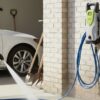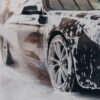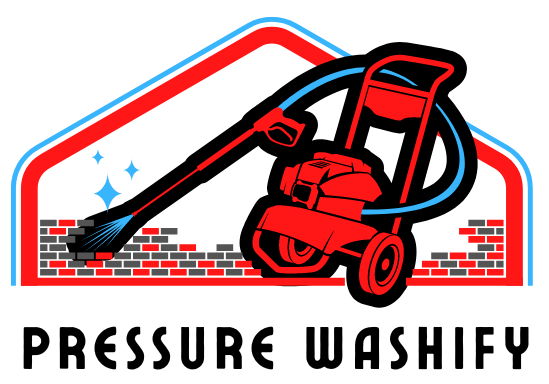Affiliate Disclaimer: This post may contain affiliate links, meaning we get a commission if you decide to make a purchase through our links, at no extra cost to you.
Introduction
A well-maintained driveway plays a surprising role in elevating the overall appearance of your property. It’s the first impression of your home for guests and passersby, making effective regular maintenance critical. The traditional method that springs to mind is, of course, using a pressure washer.
This powerful tool is undoubtedly the best way to clean and does an exceptional job at cleaning entire driveways and banishing grime and stubborn stains alike. But what if you don’t have a pressure washer at hand, or finding one poses challenges?
Don’t worry! There are plenty of alternative ways to achieve a spotlessly clean driveway without resorting to a pressure washer.
Materials Needed for Cleaning a Driveway Without Pressure Washer
Don’t let the lack of a power washer deter you. Opt for these simple, everyday household items to get your driveway looking brand new:
Cleaning Solutions
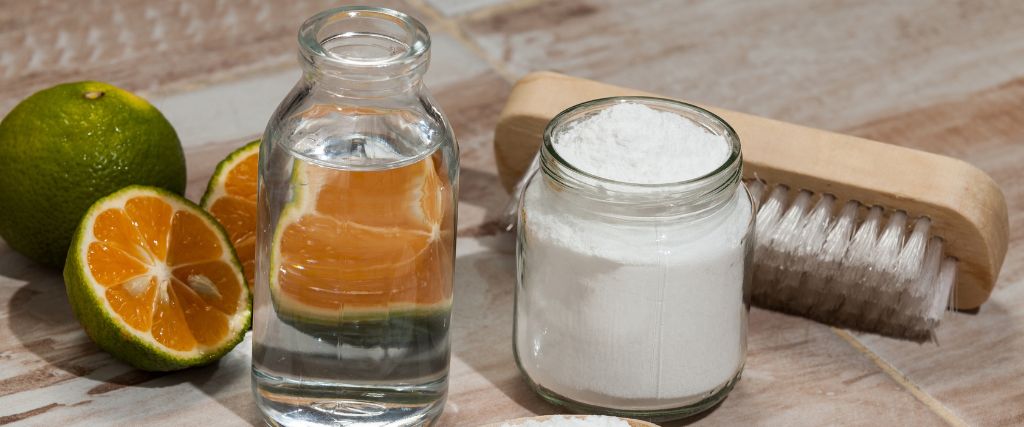
Depending on the level of dirt and type of stains on your driveway, different cleaning agents will be more effective:
- Soap and Warm Water: A bucket full of soapy warm water can work wonders for light stains and dust build-up.
- Baking Soda: Known for its powerful cleaning properties, baking soda can tackle tougher stains.
- Vinegar and Water: A go-to solution for most cleaning tasks, a vinegar and water mixture can address stubborn grime, discoloration, and oil stains.
Manual Scrubbing Tools
With your solutions ready, gather the following tools to apply them effectively:
- Stiff Bristled Brush: An effective tool for scrubbing the driveway surface and working on stubborn stains.
- Bucket: You’ll need this to mix your cleaning solution and carry it to your driveway.
- Hose with a Spray Attachment (Optional): A hose can help in rinsing off the applied solutions. If you don’t have a hose, a bucket of water will suffice.
How to Clean Driveway Without a Pressure Washer: Step-by-Step Guide
Now that you’ve got all your materials ready, it’s time to roll up your sleeves and get started.
Sweeping the Driveway
Clear the driveway of loose leaves, dirt, and debris with a regular broom. You can use a leaf blower in the fall season to speed up the work. Take your time to ensure every corner has been covered. This makes the subsequent steps easier and more effective.
Pay special attention to removing the dirt stuck inside cracks in your driveway. Also, remove the vegetation growing between slabs.
Preparing and Applying the Cleaning Solution
For light stains, mix warm water and mild dish soap in a bucket. For tougher stains, use a half-and-half mixture of baking soda and water or vinegar and water.
Soak a scrubbing brush in the chosen solution, ensuring it has soaked up the cleaning mixture well. Apply the solution liberally to the dirty areas of your driveway.
Scrubbing and Rinsing
Here comes the elbow grease part! Start scrubbing the solution into your driveway, focusing on stained areas. Scrub the area in a circular motion for effective results. Please use a soft nylon brush to avoid damaging the concrete surface.
In terms of thoroughly cleaning driveways without the use of a pressure washer, a robust arm in combination with a quality scrubbing brush can certainly do the trick. However, the cleaning effectiveness can be significantly boosted when you team this elbow grease with the application of the Rechargeable Electric Spin Scrubber.
The Rechargeable Electric Spin Scrubber offered by Seven-first is designed to save you from the physically demanding task of manually scrubbing your driveway to remove stains. Keep a bucket of soapy water nearby, just dip the brush in cleaning agent and scrub the stained areas. It’s equipped with multiple features to assist you in not only achieving a cleaner driveway but also energy preservation!
Rinse Using a Garden Hose
After scrubbing, rinse off the entire driveway using a hose with a spray nozzle. Ensure you rinse and clean the entire area, leaving no residue of the cleaning solution.
Repeat if Necessary
For stubborn stains that remain, you might need to repeat the process. Apply your cleaning solution again, scrub, and rinse. Persistence is key when you work your way through cleaning the entire driveway.
Tips for Effective Driveway Cleaning Without a Pressure Washer
To maximize the effectiveness of your cleaning process, follow these tips.
Use Scrubbing Wisely
Harsh scrubbing is not always the best approach. Depending on the type of material your driveway is made of, too much force may cause damage. Hence, use a gentle yet firm scrubbing technique.
Apply the right amount of pressure to remove stubborn stains without causing potential damage.
Let the Solution Sit
After applying your solution to the surface of the driveway, let it sit for a little while before scrubbing.
This allows the solution to penetrate more deeply into the stain, making it more effective.
Quantity of Detergent
Using more detergent does not necessarily mean a cleaner driveway. Rather, it means more scrubbing and rinsing to remove the soapy residue. Opt for the recommended quantities and resist the urge to increase soap usage.
Safety Tips When Cleaning the Driveway Without a Pressure Washer
Choose a Suitable Detergent
Not all detergents are safe for all driveway surfaces. Ensure to select a safe product that won’t damage your driveway material or harm the surrounding vegetation.
Wear Protective Equipment
While the cleaning solutions suggested in this guide are relatively mild, splashes can still irritate the skin or eyes. Consider wearing gloves and safety goggles for protection.
If you’re handling more caustic cleaners like bleach, this safety gear becomes even more crucial.
Be Mindful of Slippery Surfaces
Driveways can become quite slippery when they’re wet, especially when soap is involved. Be aware of your footing when moving around your cleaning area to avoid slips or falls.

Maintenance of Clean Driveways
Now that your entire driveway is sparkling clean, maintaining this cleanliness will reduce the frequency and intensity of future cleanings. Here are a few easy steps to follow:
Regular Sweeping
Schedule regular sweepings with an outdoor broom to remove leaves, dirt, and other debris. This simple routine prevents buildup, staining, and weed growth over time on your concrete driveway.
Immediate Stain Removal
Accidents, including oil spills and litter, happen on driveways. If your vehicle leaks oil or a beverage gets spilled, tackle these stains immediately. Fresh stains are always easier to handle than dried, set-in ones.
Driveway Sealing
Consider sealing your driveway. Sealants protect your driveway from weathering, staining, and wear and tear, extending its lifespan and enhancing its appearance.
Our recommendation
We recommend using the MasonryDefender Driveway Sealer after cleaning your driveway.
Here are its noteworthy features:
- Deep Penetration: The sealer goes deep into the concrete of your driveway, offering lasting protection from elements such as water, freezing and thawing cycles, and deicing salts, thus preserving your cleaning effects for a long.
- Clear and Non-Slip Finish: Dubbed invisible for a reason, this sealer dries clear, preserving the natural look of your driveway while ensuring it’s safe to walk on, even in wet conditions.
- Easy Application: This user-friendly sealer can be applied via a roller, brush, or sprayer, eliminating the necessity for specialized equipment like a pressure washer.
- Protection from De-icing Salts: Winter months can be tough on your concrete driveway. However, with this sealer, you protect it from the harmful effects of de-icing salts.
MasonryDefender Driveway Sealer
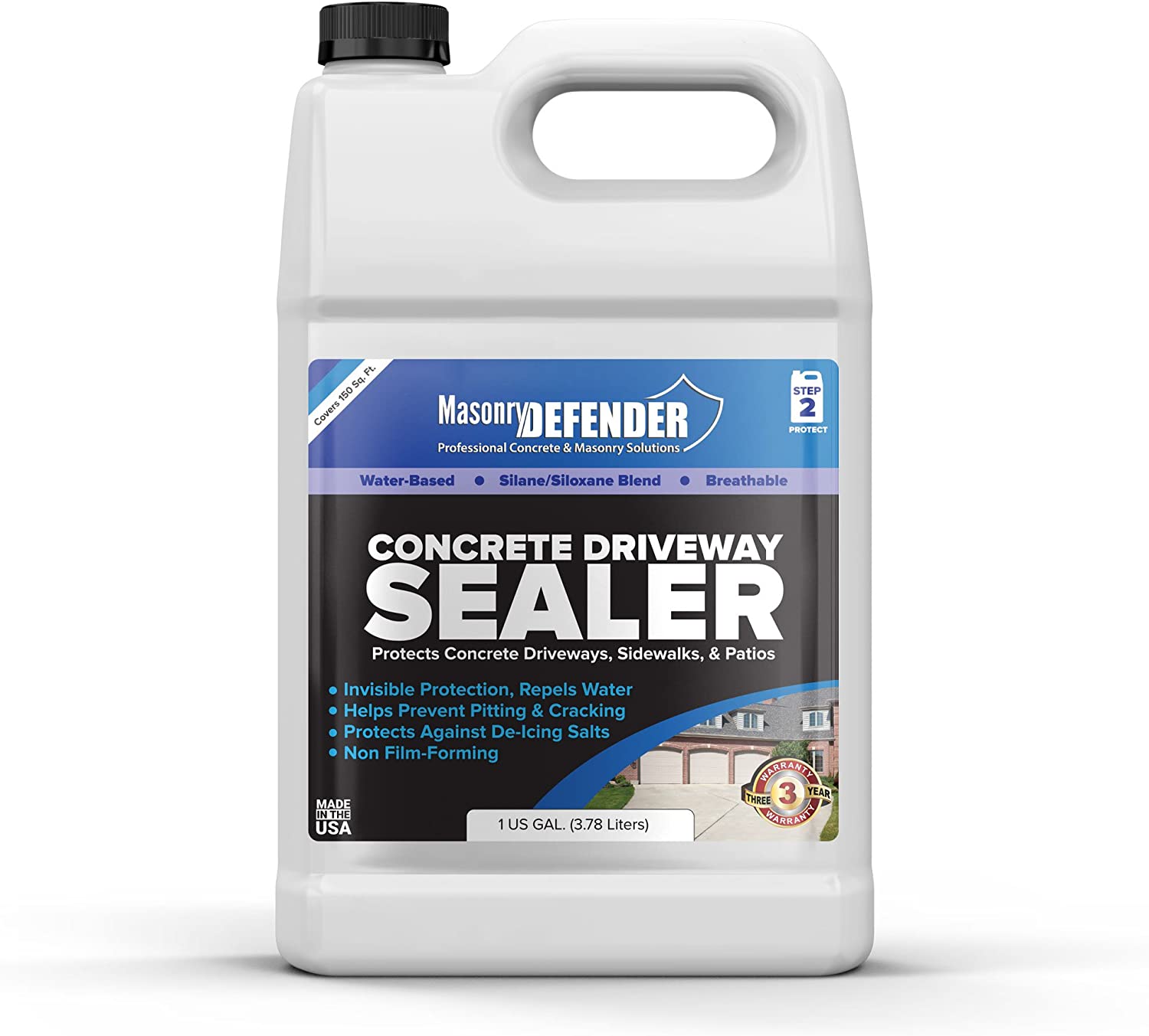
- Siloxane based
- Water repellant
- Compatible with concrete
- Deep penetration
Remember the hard work you’ve put into cleaning your driveway and enhancing its appearance. The MasonryDefender Concrete Sealer can fortify the cleanliness and prolong the pristine look of your driveway, making it a worthy addition to your cleaning regimen!
Mindful Use
Last but not least, be mindful of activities on your concrete driveway that could lead to staining or damage from oil stains or even kitty litter. This could mean parking leaking vehicles elsewhere or relocating messy DIY projects to another location.
Wrapping Up
Learning how to clean a driveway without a pressure washer is an achievable goal using affordable household materials and a bit of elbow grease. By incorporating the mentioned steps, tips, and safety measures into your cleaning routine, you can effectively clean and maintain your driveway without the need for professional equipment or services.
By following key insights like regular driveway sweeping, tackling fresh stains, and mindful use, you ensure a long-lasting clean appearance for your driveway, ultimately enhancing the curb appeal and value of your property.
A well-kept driveway not only improves the aesthetic appeal of your home but also boosts its value.
Read more: How to clean cement patio without a pressure washer.
Frequently Asked Questions (FAQs)
Q1: Can baking soda damage my driveway?
No, baking soda is mild and safe to use on most surfaces, including driveways.
Q2: What can I do if the stains still persist after cleaning?
If stubborn stains persist after cleaning, repeating the process or leaving the detergent to soak on the stains longer can help break them down.
Q3: How often should I clean my driveway?
The frequency of cleaning may depend on usage and exposure to elements. As a rule of thumb, a thorough cleaning twice a year with a suitable degreaser and pressure wash should suffice for most concrete driveways.
Q4: What safety measures should I take while cleaning my driveway?
Wearing gloves and safety goggles can protect your skin and eyes from irritations caused by splashes of cleaning solutions. Also, because wet surfaces can be slippery, watch your footing during the cleaning process.
Q5: How do I prevent stains on my driveway in the future?
Regular sweeping and immediate cleaning of spills will prevent stain buildup. Consider sealing your driveway, and be mindful of activities that can cause staining or damage.
Q6: Can I use this method to clean all types of driveway surfaces?
Yes, our method is mild and safe for virtually all driveway materials — concrete, asphalt, brick, or pavers. However, always test any cleaning solution on a small, inconspicuous area first to ensure it doesn’t discolor or damage the material.






